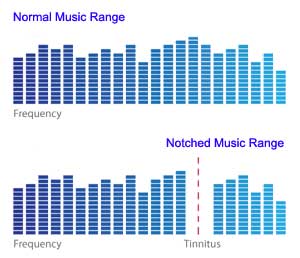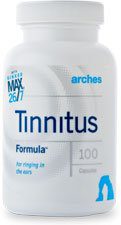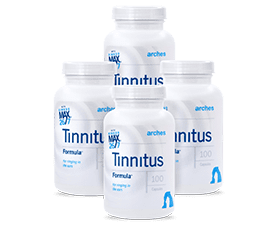By Barry Keate
Barry Keate, has lived with tinnitus over 40 years and has published 150+ research articles on numerous aspects of tinnitus. He is an expert on the condition and a well-known advocate for those with tinnitus.
Sound therapy for tinnitus treatment has been used in various forms for many years in an attempt to reduce the sound level and aggravation of tinnitus. A new development in this field is the idea of digitally removing a band of sound from music. The removed band is centered on an individual’s tinnitus frequency. The music, minus the tinnitus frequency, is played back to the person. After a period of listening to this music on a daily basis, tinnitus loudness and annoyance are, in theory, reduced.
Tinnitus Sound Therapy
Sound therapy has been found to be effective in making tinnitus less noticeable. When pleasant sounds surround us, tinnitus recedes into the background. Sounds from white noise (like a radio between stations), to the sound of running water, and music, all help to take our mind off tinnitus.
Music has proven successful in managing pain and anxiety. It promotes relaxation and positively engages the limbic system, which is the emotional center of the brain. In this way it has the potential to help manage tinnitus.
Sound therapies are available as counter-top devices like sound generators and tabletop water fountains. These can be found in most department stores. Also available are CD based systems such as those from the Tinnitus Control Center in New York City.
Masking devices have been used for several years. They look like hearing aids but produce white noise to mask tinnitus. Combination hearing aids and masking devices are very popular.
In-the-ear sound generators are used in Tinnitus Retraining Therapy (TRT). These look like tinnitus maskers but produce a much lower volume of sound. Music therapy is used in the newer version of TRT called Neuromonics.
Notched Music Therapy
The idea behind notched music therapy is that damaged hair cells in the cochlea do not transmit signals. Since hair cells are assigned to specific frequencies, those frequencies are missing from the transmission. Neurons in the auditory cortex attuned to those same frequencies are deprived of normal electrical input because of the damaged hair cells. However, the neurons don’t become inactive. Instead, they are “rewired” so they are no longer excited by the frequencies to which they were once attuned. Instead, they become sensitive to close neighboring frequencies and fire when those frequencies are present.
When they fire, they transmit electrical signals to the brain at the frequency to which they were originally attuned and not at the neighboring frequencies that caused the neuronal excitement. This explains why people hear tinnitus at a frequency where they have damage to the hair cells in the cochlea.
Researchers in Germany reasoned that by notching out the frequencies surrounding that of tinnitus, they could play this “notched” music back to the tinnitus patient. The notched music does not stimulate the cortical area corresponding to the tinnitus frequency but it still excites surrounding neurons. The neurons that aren’t stimulated are suppressed via “lateral inhibition” from the surrounding neurons.
Lateral inhibition is a term used in neurobiology to refer to the capacity of an excited neuron to reduce the activity of its neighbors.
 The German researchers conducted a series of clinical studies where they filtered out individual patient’s tinnitus frequency. (1) (2) The patients selected their favorite music. The frequency spectrum of the music was modified for each individual patient by means of digitally filtering out the frequency band of a one octave bandwidth centered at the individual tinnitus frequency. This way they did not excite any of the very close neurons to the tinnitus frequency.
The German researchers conducted a series of clinical studies where they filtered out individual patient’s tinnitus frequency. (1) (2) The patients selected their favorite music. The frequency spectrum of the music was modified for each individual patient by means of digitally filtering out the frequency band of a one octave bandwidth centered at the individual tinnitus frequency. This way they did not excite any of the very close neurons to the tinnitus frequency.
The patients listened to their customized music therapy for approximately 2-3 hours per day over the course of 12 months. At the end of the year they experienced significantly reduced subjective tinnitus loudness. Annoyance levels from tinnitus were also significantly reduced.
In contrast, patients who had instead listened to pleasant placebo music did not experience any significant changes.
As the result of these studies, several companies have sprung up offering customized notched music for people suffering from tinnitus. While there have been reasonably good results from clinical studies and a lot of excitement on the part of some researchers, there are several drawbacks to the therapy and still a long way to go before it becomes clinically effective.
Note: Updated January 30, 2022
A recent study was designed using notched therapy employing a smartphone app for listening combined with Ginkgo biloba. (1)
The trial lasted only for 3 months, compared with previous trials that continued for 12 months. So, the notched music therapy portion may not have achieved its full potential as in past studies. While the dosage of Ginkgo biloba was not disclosed, Ginkgo typically reaches its full effect in 3 months and may account for the majority of improvement in the trial.
The patients who underwent this music therapy and Ginkgo combined treatment showed improved Tinnitus Handicap Inventory (THI) scores, particularly the emotional score of the THI. The combined THI score was lowered from an average of 33.9 to 23.1. The researchers stated the combined treatment may be yet more effective in those with a higher THI, indicating worse tinnitus.
Notched Music Issues
One drawback is the therapy takes up to 12 months to become effective while the patient is listening to music for about 15 hours per week. This amounts to 780 hours per year and can be quite demanding for some people who do not have the time to commit to it.
Another potential problem is the studies were conducted on participants with no significant hearing loss. Most people with tinnitus have hearing loss as the primary cause. The second study (referred to here) ends with this statement, “The future challenge will be to provide a similar training approach for tinnitus patients with hearing loss…”
A third unknown is how long the effects of the therapy will last. Studies have been very small and participants have not been followed up for long periods to determine efficacy over time. It may turn out that this therapy is one that will require continuous treatment or the previous level of tinnitus will return.
 Notched music therapy shows promise and is one of many interesting advances in the treatment of tinnitus. As found above, the addition of Ginkgo biloba, which contains bilobalide, a powerful glutamate antagonist and neuroprotective agent, can be a valuable addition to the therapy.
Notched music therapy shows promise and is one of many interesting advances in the treatment of tinnitus. As found above, the addition of Ginkgo biloba, which contains bilobalide, a powerful glutamate antagonist and neuroprotective agent, can be a valuable addition to the therapy.
Arches Tinnitus Formula contains Ginkgo Max 26/7, the most concentrated and powerful Ginkgo extract available. It is high in bilobalide, a glutamate antagonist which reduces glutamate and provides neuroprotection. It also causes increased circulation and antioxidant activity, promoting cortical reorganization to which these therapies attain.
References:
1 – Okamoto H, Stracke H, Stoll W, Pantev C. “Listening to tailor-made notched music reduces tinnitus loudness and tinnitus-related auditory cortex activity.”Institute for Biomagnetism and Biosignalanalysis, Westfalian Wilhelms University, Muenster, Germany. Approved December 3, 2009 and published in the Proceedings of the National Academy of Sciences. www.pnas.org/cgi/doi/10.1073/pnas.0911268107.
2 – Strache H, Okamoto H, Pantev C. “Customized notched music training reduces tinnitus loudness.” Commun Integr Biol. 2010 May-Jun; 3(3): 274-277. https://www.ncbi.nlm.nih.gov/pmc/articles/PMC2918775/
3 – Kim SY, Chang MY, Hong M, et.al. Tinnitus Therapy Using Tailor-Made Notched Music Delivered via a Smartphone Application and Ginkgo Combined Treatment: A Pilot Study. Auris Nasas Larynx, Vol. 44, Issue 5, October 2017, pp. 528-533. https://www.sciencedirect.com/science/article/abs/pii/S0385814616303728
Get Free Shipping!
Order now and get free shipping on either the Tinnitus Starter Kit or Combo Pack. Try the doctor recommended products with clinically proven ingredients for tinnitus. No coupon code required.

